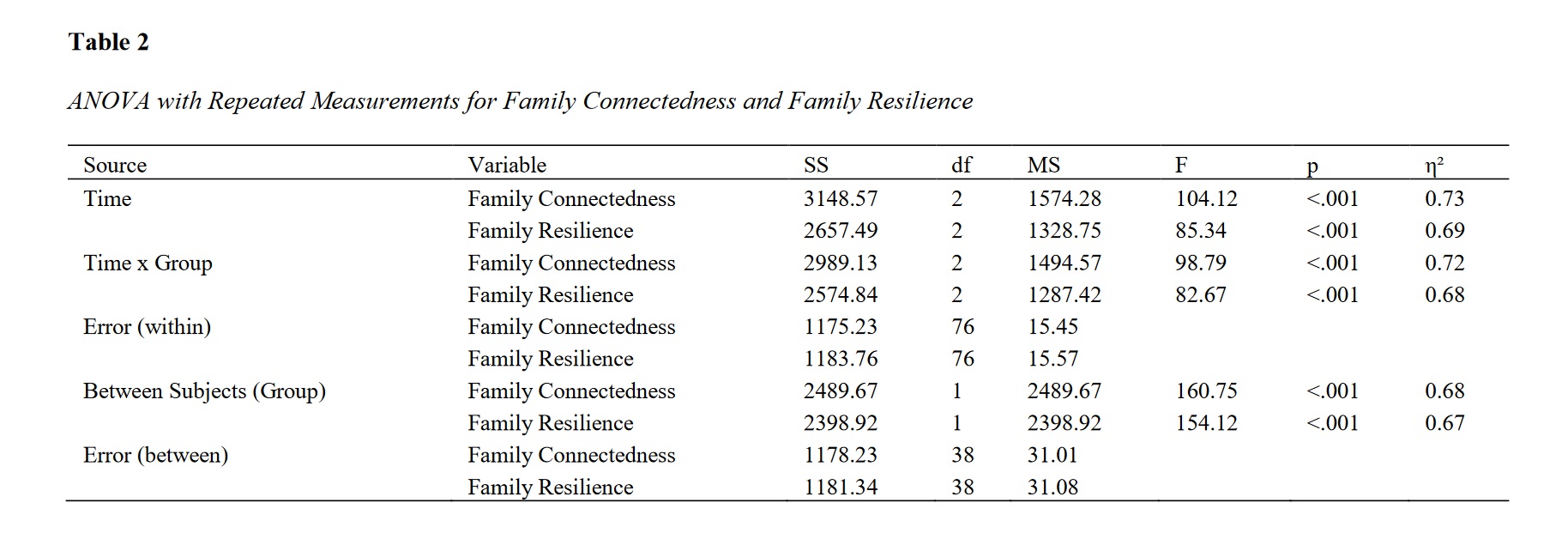Enhancing Family Connectedness and Resilience through Emotionally Focused Therapy: A Randomized Controlled Trial
Keywords:
Emotionally Focused Therapy, Family Connectedness, Family Resilience, Couples Therapy, Randomized Controlled Trial, Family Dynamics, Psychological Well-beingAbstract
Objective: This study aims to evaluate the effectiveness of Emotionally Focused Therapy (EFT) for couples in enhancing family connectedness and family resilience.
Method: A randomized controlled trial was conducted with 40 couples (80 participants) who were randomly assigned to an intervention group (EFT) or a control group (no intervention). Each group comprised 20 couples. The intervention group received eight 75-minute EFT sessions over four months. Family connectedness and resilience were measured using the Family Connectedness Scale (FCS) and Family Resilience Assessment Scale (FRAS) at baseline (T1), post-intervention (T2), and four-month follow-up (T3). Data were analyzed using ANOVA with repeated measurements and Bonferroni post-hoc tests, with SPSS version 27.
Results: The intervention group showed significant improvements in family connectedness and resilience. Mean scores for family connectedness increased from 32.45 (SD = 4.12) at T1 to 45.38 (SD = 3.78) at T2 and were maintained at 44.95 (SD = 3.92) at T3. Family resilience scores increased from 48.62 (SD = 5.11) at T1 to 59.74 (SD = 4.89) at T2 and were maintained at 58.67 (SD = 5.02) at T3. The ANOVA results indicated significant main effects of time for both family connectedness (F(2, 76) = 104.12, p < .001, η² = 0.73) and family resilience (F(2, 76) = 85.34, p < .001, η² = 0.69). The time x group interactions were also significant for family connectedness (F(2, 76) = 98.79, p < .001, η² = 0.72) and family resilience (F(2, 76) = 82.67, p < .001, η² = 0.68). Bonferroni post-hoc tests confirmed significant improvements from T1 to T2 and T1 to T3 for both variables.
Conclusion: Emotionally Focused Therapy is effective in significantly enhancing family connectedness and resilience among couples. These improvements were maintained at a four-month follow-up, suggesting that EFT provides long-lasting benefits for family dynamics.
Downloads

Downloads
Additional Files
Published
Issue
Section
License
Copyright (c) 2024 Shokouh Navabinejad (Author); Nadereh Saadati (Corresponding Author)

This work is licensed under a Creative Commons Attribution-NonCommercial 4.0 International License.






